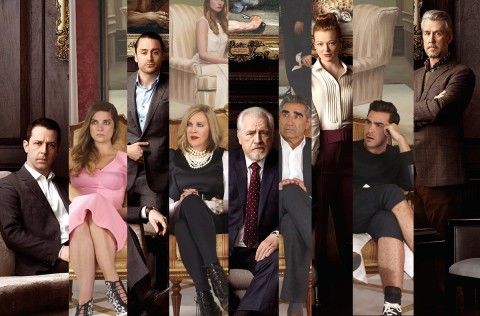(De)formed by wealth in Succession and Schitt’s Creek
Is there any redemption for the Roy family or the Rose family?

The behavior of the über-wealthy has always been a source of fascination in American culture. That fascination has often included a suspicion that wealth deforms and corrupts people. As wealth disparity reaches new heights and the middle class shrinks, this combination of fascination and wariness may be peaking. Two recent TV shows, Succession and Schitt’s Creek, suggest there’s also a longing to imagine a world without the structures of power that allow great wealth disparities in the first place.
Succession (now in its second season on HBO) follows the fictional Roy family as they jockey for power inside a massive global media and entertainment conglomerate called Waystar Royco, (clearly based on News Corp/Fox News), founded by the patriarch Logan Roy (Brian Cox). His four adult children fight each other for his love and for power in the company, which seem to amount to the same thing in this family.
Each character is a unique moral mess, unable to escape from the bubble of wealth and power that has cushioned their lives. Kendall (Jeremy Strong), the heir apparent, can almost glimpse how badly he has been twisted by his father, but he does not know any other life and cannot imagine walking away from it. The only daughter, Shiv (Sarah Snook), tries to leave the family business for a life in politics but is slowly pulled into her father’s empire when she realizes how little power she has outside the family. Their younger brother, Roman (Kieran Culkin), is an arrogant gadfly whose desire for power is in inverted proportion to his qualifications to hold it. And the oldest son by a first marriage, Connor (Alan Ruck), may be the most viperous of all, feigning spiritual aloofness from the family business while sabotaging his siblings at every turn.





